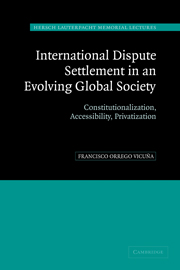 International Dispute Settlement in an Evolving Global Society
International Dispute Settlement in an Evolving Global Society Published online by Cambridge University Press: 04 August 2010
An inherent right to bring claims and seek remedies under international law
Just as the developments in international society relating to decentralization suggest the need for a centralized court to ensure the constitutional unity of such society, so too the process of globalization requires that participants in the system have adequate access to international dispute settlement. The significant participation of individuals and corporations in the global society creates a need for them to have access to dispute settlement, which thus far has been only a limited feature of the inter-state system.
The view that only states are subjects of international law is no longer sustainable either in theory or practice. The opposite view, that individuals are the sole subjects of international law, while perhaps more attractive as a matter of legal theory, has not found support in an international society where states and international organizations participate as entities endowed with international personality. It is no longer disputed that individuals have international personality and may be direct beneficiaries of rights, as well as have duties, under international law. But there is still a major unsettled question in respect of their capacity to exercise these rights and to be held responsible for their duties in the international legal system.
As has been pointed out, “[l]egal personality is an acknowledgement that an entity is capable of exercising certain rights and being subject to certain duties on its own account under a particular system of law.”
To save this book to your Kindle, first ensure [email protected] is added to your Approved Personal Document E-mail List under your Personal Document Settings on the Manage Your Content and Devices page of your Amazon account. Then enter the ‘name’ part of your Kindle email address below. Find out more about saving to your Kindle.
Note you can select to save to either the @free.kindle.com or @kindle.com variations. ‘@free.kindle.com’ emails are free but can only be saved to your device when it is connected to wi-fi. ‘@kindle.com’ emails can be delivered even when you are not connected to wi-fi, but note that service fees apply.
Find out more about the Kindle Personal Document Service.
To save content items to your account, please confirm that you agree to abide by our usage policies. If this is the first time you use this feature, you will be asked to authorise Cambridge Core to connect with your account. Find out more about saving content to Dropbox.
To save content items to your account, please confirm that you agree to abide by our usage policies. If this is the first time you use this feature, you will be asked to authorise Cambridge Core to connect with your account. Find out more about saving content to Google Drive.